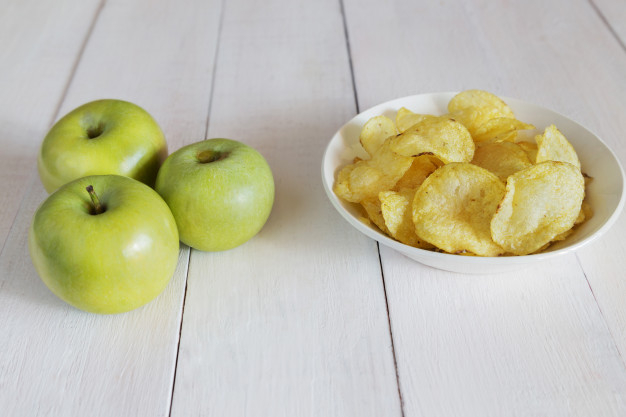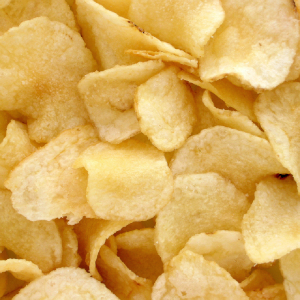A huge number of folks who want to lose a little weight (and some who want to lose a lot of weight) take the effort into their own hands. But many of them fail to live up to their resolutions to eat healthier and eat less. Researchers now say it’s not because those folks are weak-willed…
 Why do many of us choose the chips rather than the apple? Apparently without thinking?
Why do many of us choose the chips rather than the apple? Apparently without thinking?
Given a choice, on a buffet, of fries or baked potatoes, you reach for the fries. ‘Almost without thinking’, you may remark to yourself, if you’re paying any attention at all to your dining choices. But new research suggests it’s not entirely ‘lack of self control’ that’ causes you to make bad food choices, especially at snack time.
What they did
Researchers at Duke University wanted to explore the dynamics of human food-decision making.
“We spend billions of dollars every year on diet products, yet most people fail when they attempt to diet,” said study co-author Scott Huettel, a professor of psychology and neuroscience at Duke. “Taste seems to have an advantage that sets us up for failure.”
The team recruited a test group of 79 young adults with a median age of 24.4 years. They requested that the study participants fast for four hours before the experiment to ensure they arrived hungry. Participants were asked to rate snack foods on their tastiness, healthfulness and desirability. Then, they were then presented with pairs of foods and asked to choose between them.
What they found
In short, the taste information about sample foods beat the healthiness information to subjects’ brains by a hair. About 400 milliseconds, in fact. And that, the researchers say, is enough for the faster impulse to influence our choice.
“For many individuals, health information enters the decision process too late (relative to taste information) to drive choices toward the healthier option,” Huettel says.
“We’ve always assumed people make unhealthy choices because that’s their preference or because they aren’t good at self-control,” says study co-author Nicolette Sullivan. “It turns out it’s not just a matter of self-control. Health is slower for your brain to estimate – it takes longer for you to include that information into the process of choosing between options.”
The Takeaway
The authors say their findings could apply to other choices, not just food. Some financial decisions, such as saving and spending choices, may also be affected by how – and when – the brain processes different types of information. Decisions about other fast-moving activities such as whether or not to click on a certain internet link may also be effected by this mechanism.
Heuttel and Sullivan suggest that consciously slowing down our decision making process may help us make the healthier choice when it comes to on-the-go food decisions.
My take
I’ve always suspected there was some unseen influence acting on my admittedly self-destructive food choices. I’ve often agonized over the choice of whether to pick up a bag of apples or a bag of chips at the grocery store. But when the apples are already in my cart, I usually pass up the chips. Thank the produce managers for placing the produce aisle right where one enters their stores, not at the far end, last thing before the checkout! Curiously, the Chips and Candy aisle is almost always smack in the middle of the store. I’ll have to ask my friendly supermarket manager, Steve, why that is. (Never assume that any aspect of the layout of a supermarket floor is left to chance!)
About taking longer to consider on-the-fly choices; I think I can master that skill given time and consistent application of the principle. And I agree with the researchers that it’s a good idea. I also like the idea that my occasional failure to make the healthiest choice when shopping or snacking is not entirely due to a character flaw!
~ Maggie J.

